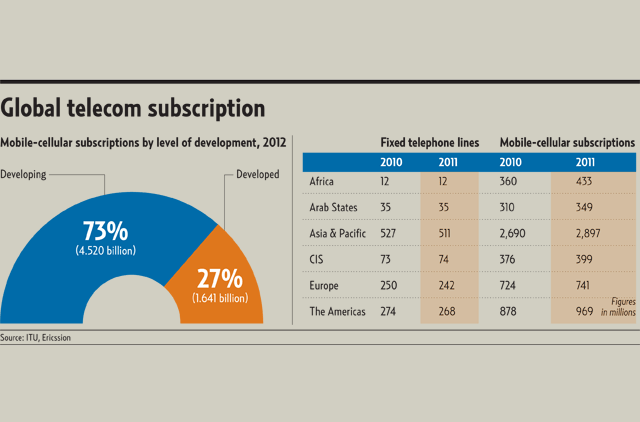
Dubai: Worldwide telecom subscriptions will soon surpass the global population of seven billion people, according to latest industry reports.
Mobile penetration has reached 85 per cent globally and subscriptions now total around six billion — fast catching up with the 80 per cent of people who have access to electricity, figures released on Sunday show.
A report by Ericssion said the actual number of subscribers is lower because often people have more than one phone. But the contract uptake is faster than the global birth rate.
"Though there are now around 6 billion mobile subscriptions, this figure equates to around 4.1 billion subscribers, since many subscribers have several subscriptions," said the report, released yesterday.
"Nevertheless, nearly 60 per cent of people alive today now have at least one mobile subscription."
‘Mass market product'
India and China together accounted for approximately 35 per cent of the estimated 180 million new subscriptions added in the fourth quarter of 2011. Brazil, Indonesia and Bangladesh complete the top five countries in terms of new subscriptions.
"Over the last decade mobile services have moved from being a premium offering to a mass market product," Bhanu Chaddha, IDC's senior research analyst in telecommunications for the Middle East, Africa and Turkey, told Gulf News.
"It has brought about a transformational change in the way people communicate. In fact, many studies have established a direct correlation between increase in mobile penetration and the GDP growth rates.
"Mobile is now playing a crucial role in socio-economic development, especially in the emerging markets of Africa, Asia and the Latin America.
"With mobile services, traders living even in remote hinterland can have access to real time market information and can hence make informed business decisions."
The International Tele-communication Union (ITU) reported that the fixed-line market continues to decline, as it has done since 2005, especially in developed countries where mobiles now dominate.
‘Continuous growth'
"Over the past two years, the world has witnessed continuous growth of ICT services and uptake worldwide," said Brahima Sanou, director of the ITU's Tele-communication Development Bureau.
"All 152 economies included in the ICT Development Index (IDI) have improved their scores, confirming the continuous spread of ICT and the growing global information society.
"While most of the leading IDI countries are still from the developed world, it is encouraging to see that the most dynamic performers are developing countries.
"The majority of these are middle-income countries, however, and most of the least developed countries remain at the bottom of the index."
Internet users have doubled over the past five years to more than two billion worldwide, the ITU report shows.
Mobile broadband subscriptions increased by 60 per cent year-on-year and now number close to 1 billion.
Smartphone uptake remains strong in all regions. Approximately 30 per cent of all handsets sold in 2011 were smartphones, compared to 20 per cent in 2010.
However, smartphones account for only 10 per cent of worldwide subscriptions, which suggests there is considerable room for growth.
The growth in mobile data traffic also continues, doubling between the third quarters of 2010 and 2011, matching the rate recorded between the second quarters of 2010 and 2011. Quarterly growth between the second and third quarters of last year was 18 per cent.
Mobile voice traffic has doubled over the past four years and continues to increase at a steady pace. This is especially true in regions where there has been a considerable increase in subscriptions, such as the developing nations in Asia.
Mobile data traffic
The traffic generated by mobile PC users varies widely between individuals and markets, but Ericsson estimates the global average is around 2GB per month.
Ericsson says mobile data traffic will grow ten-fold between 2011 and 2016, mainly driven by video, while mobile broadband subscriptions are expected to grow from 900 million in 2011 to almost 5 billion in 2016.
That would represent 60 per cent year-on-year growth, at the same time as the data consumed by smartphone users is surging. Total smartphone traffic is expected to triple during 2012.
By 2016, users living on less than 1 per cent of the Earth's total land area will generate 60 per cent of mobile traffic.













